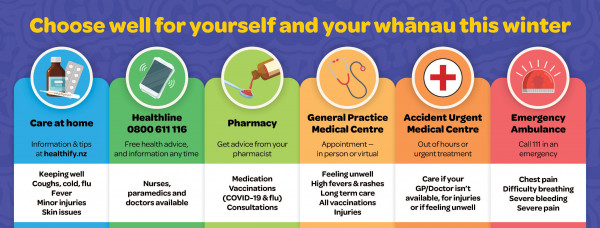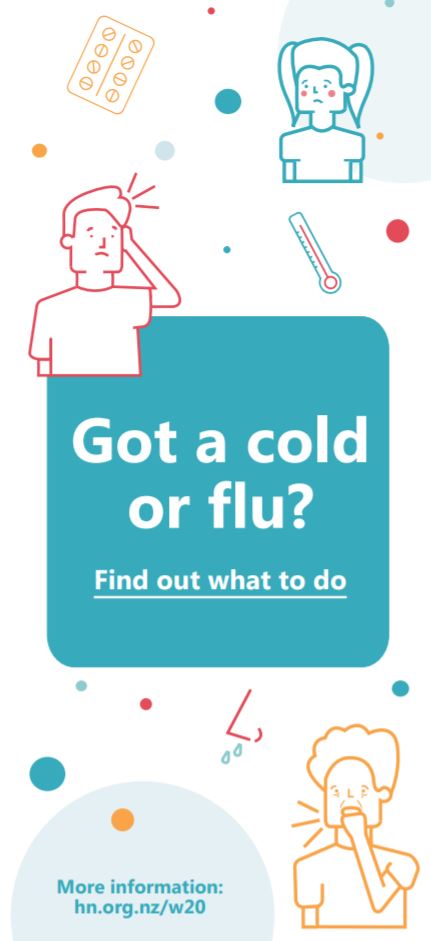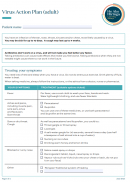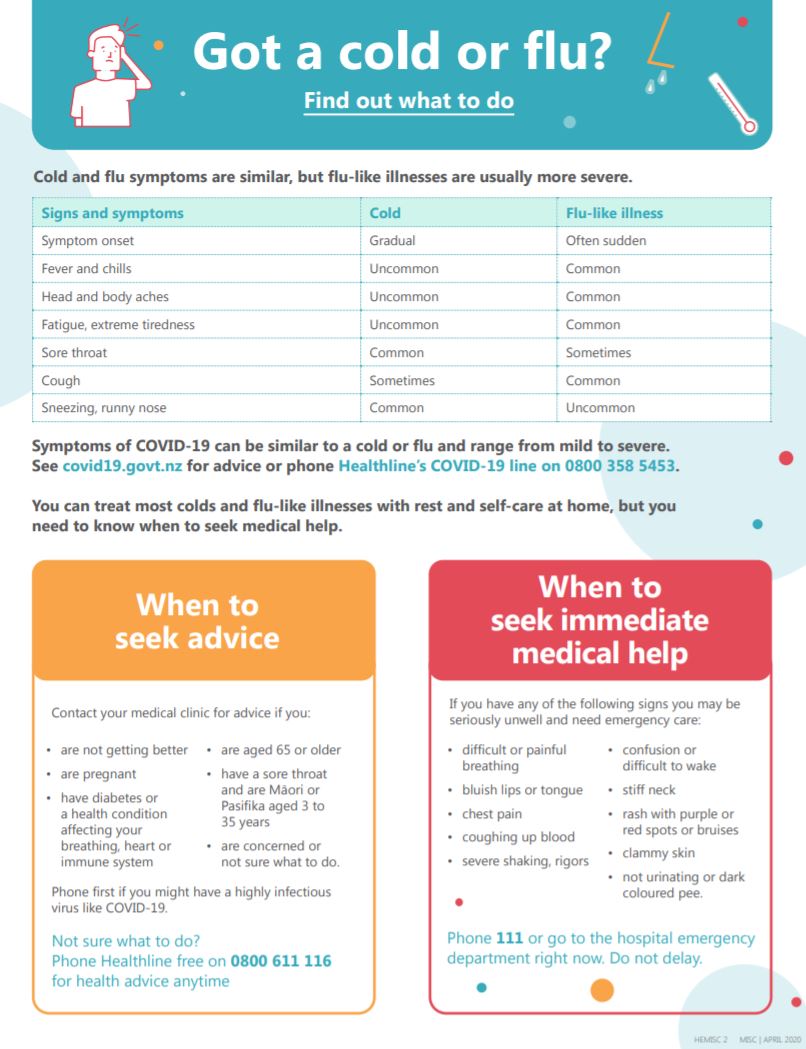Low or no data? Visit zero.govt.nz, scroll down the page then click on our logo to return to our site and browse for free.
Cold or the flu? Or COVID-19?
Maremare, rewharewha, mate korona?
Key points about cold, the flu or COVID-19
- Having a cold, the flu or COVID-19 is now common during the short, cold days of winter. It's good to know the difference.
- Colds, influenza (the flu) and COVID-19 all affect your airways and how you breathe. This means they are easily confused with one another. While a cold is not usually serious, the flu and COVID-19 can be.
- If you have symptoms, get a COVID test and if you are (or think you might be) positive, get somebody else to pick up cold and flu medicines for you, don't go into a pharmacy yourself.

Symptoms of COVID-19 are similar to having a cold or the flu.
Symptoms of COVID-19 can include:
- a cough
- a fever (temperature of 38˚C or higher)
- shortness of breath
- a sore throat
- sneezing and runny nose
- temporary loss of smell
- upset stomach, possible with diarrhoea (runny poo) or vomiting (being sick).
If you have any of these symptoms, get tested for COVID-19.
A cold is a mild illness lasting 1 to 2 weeks, although some symptoms can last longer, eg, a cough.
- Early symptoms can include a sore throat, sneezing, runny nose, mild fever.
- After a few days, snot usually becomes thicker and may turn a greenish or yellowish colour.
- It doesn't usually involve muscle pain.
- It can include a mild headache (congested sinuses).It can include a cough.
Complications can include sinus congestion and ear infection.
The flu (influenza) is a moderate to severe illness with sudden onset of symptoms lasting 7 to 10 days.
- There can be sudden onset of:
- fever (temperature of 38°C or higher)
- shivering
- muscle aches
- extreme tiredness
- headache, sometimes severe
- It can include a dry cough that can become moist
- Bed rest is needed.
- The cough and tiredness can last for weeks after the rest of the illness is over.
Possible complications are bronchitis and pneumonia.
- Rest at home.
- Drink plenty of fluids to stay hydrated.
- If you have a sore throat, suck a teaspoon of honey or gargle with salt water. Adults can also try using a gargle, throat spray or pain-relief (anaesthetic) lozenges. Don't give honey to children under 12 months old.
- For a blocked or runny nose ask your pharmacist about decongestants and saline nasal sprays.
- For a cough sip a lemon and honey drink or ask your pharmacist about cough lozenges or medicines that may be suitable for you. Cough medicine doesn’t cure a cough but may give you some relief.
- For aches and pains try paracetamol OR cold and flu medicines (check doses carefully and ask your doctor or pharmacist what is safe for you).
You can treat most colds and flu-like illnesses with rest and self-care at home, but you need to know when to seek medical help.
 Image credit: Te Whatu Ora
Image credit: Te Whatu Ora
Phone your medical clinic for advice if you:
- are not getting better
- are pregnant
- have diabetes or a health condition affecting your breathing, heart or immune system
- are aged 65 or older
- have a sore throat and are Māori or Pasifika aged 3–35 years
- are concerned or not sure what to do.
If you are unsure what to do phone Healthline(external link)(external link) free on 0800 611 116 or your doctor for advice.
|
When to seek immediate medical help |
|---|
|
If you have any of the following signs you may be seriously unwell and need emergency care:
Phone 111 or go to the hospital emergency department right now. Do not delay. |
Vaccination is the best way to avoid getting COVID-19 and the flu. Read more about COVID vaccination and flu vaccination.
Other things you can do to stop the spread:
- Wash your hands for 20 seconds and dry them well.
- Cover your coughs and sneezes.
- Avoid touching your face.
- Don’t share toothbrushes, cups, food utensils or towels.
- Clean and disinfect surfaces, like doorknobs, often.
- Stay home if you're sick and avoid close contact with others.
Keep your immune system strong Healthify He Puna Waiora, NZ
Colds Healthify He Puna Waiora, NZ
Influenza Healthify He Puna Waiora, NZ
Influenza (flu) topics Healthify He Puna Waiora, NZ
Resources
Got a cold or flu? Find out what to do brochure(external link)(external link) Health Promotion Agency, NZ & Healthify He Puna Waiora, NZ
Got a cold or flu? Find out what to do factsheet(external link)(external link) Health Promotion Agency, NZ & Healthify He Puna Waiora, NZ
Your family & antibiotics: What you need to know(external link)(external link) PHARMAC, NZ
Cold or flu? Know the difference [PDF, 327 KB] Health Direct, Australia, 2016
Virus action plan (adult)(external link)(external link) He Ako Hiringa, NZ, 2023 te reo Māori(external link), Samoan(external link), Tongan(external link), Arabic [PDF, 188 KB], Hindi(external link), Chinese (simplified)(external link)
Virus action plan (child)(external link)(external link) He Ako Hiringa, NZ, 2023 te reo Māori(external link), Samoan(external link), Tongan(external link), Arabic [PDF, 214 KB], Hindi(external link), Chinese (simplified)(external link)
Information for managing seasonal viral illness (“Cold & Flu”)(external link) BPAC, 2023
Brochures

Health Promotion Agency, NZ & Healthify He Puna Waiora, NZ

Virus action plan (adult)(external link) He Ako Hiringa, NZ, 2023 te reo Māori, Samoan, Tongan, Arabic, Hindi, Chinese (simplified)
Virus action plan (child)(external link) He Ako Hiringa, NZ, 2023 te reo Māori, Samoan, Tongan, Arabic, Hindi, Chinese (simplified)

Health Promotion Agency, NZ & Healthify He Puna Waiora, NZ
Credits: Healthify editorial team. Healthify is brought to you by Health Navigator Charitable Trust.
Page last updated:





